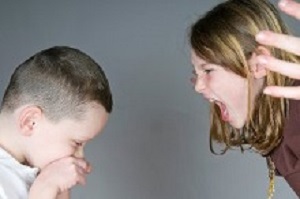 People who were bullied by siblings during childhood are up to three times more likely to develop psychotic disorders such as schizophrenia in early adulthood, according to research by the University of Warwick. Led by Professor Dieter Wolke (senior author) at Warwick's department of psychology, this is the first study to explore the relationship between sibling bullying and the development of psychotic disorders.
People who were bullied by siblings during childhood are up to three times more likely to develop psychotic disorders such as schizophrenia in early adulthood, according to research by the University of Warwick. Led by Professor Dieter Wolke (senior author) at Warwick's department of psychology, this is the first study to explore the relationship between sibling bullying and the development of psychotic disorders.
Almost 3,600 children from the Avon Longitudinal Study of Parents and Children completed a detailed questionnaire on sibling bullying at twelve years of age, and then subsequently filled out a standardised clinical examination assessing psychotic symptoms when they were eighteen years old.
Of the adolescents, 664 were victims of sibling bullying, 486 children were pure bullies to their siblings and 771 children were bully-victims (victimised by siblings and bullied their siblings), at age twelve – 55 of the total 3,600 children in the study had developed a psychotic disorder by the age of eighteen.
The researchers found that the more frequently children are involved in sibling bullying – either as bully, victim, or both – the more likely they are to develop a psychotic disorder. Those involved in sibling bulling (as bully or victim) several times a week or month are two to three times more likely to develop a psychotic disorder than other kids. The children most at risk are victims of sibling bullying, and those who both become victims and bully their siblings (bully-victims). Children who are victimised both at home and by school peers are even worse off – being four times more likely to develop psychotic disorders than those not involved in bullying at all.
Senior author Professor Dieter Wolke from the University of Warwick's department of psychology, commented: "Bullying by siblings has been until recently widely ignored as a trauma that may lead to serious mental health problems such as psychotic disorder. Children spend substantial time with their siblings in the confinement of their family home and if bullied and excluded, this can lead to social defeat and self-blame and serious mental health disorder – as hown here for the first time."
First author Slava Dantchev, from the University of Warwick, adds: "If the bullying occurs at home and at school the risk for psychotic disorder is even higher. These adolescents have no safe place. Although we controlled for many pre-existing mental health and social factors, it cannot be excluded that the social relationship problems may be early signs of developing serious mental health problems rather than their cause."
The researchers conclude that parents and health professionals should be made aware of the long-term mental health consequences that sibling bullying may have – and that interventions must be developed in order to reduce and even prevent this form of aggression within families.
Psychotic disorders – such as schizophrenia or bipolar disorder – cause abnormal thoughts and perceptions, and often involve hallucinations or delusions. Sufferers often experience severe distress and changes in behaviour and mood and have a much increased risk of suicide and health problems.
Abstract
Being bullied by a sibling has been recently identified as a potential risk factor for developing depression and self-harm. It is unknown whether this risk extends to other serious mental health problems such as psychosis. We investigated whether sibling bullying victimization or perpetration in middle childhood was prospectively associated with psychotic disorder in early adulthood.
The current study investigated 6988 participants of the Avon Longitudinal Study of Parents and Children, a UK community-based birth cohort. Sibling bullying was reported at 12 years and psychotic disorder was assessed via a semi-structured interview at 18 years.
Involvement in sibling bullying was associated with psychotic disorder in a dose-response fashion, even after controlling for a range of confounders. Those involved several times a week were 2–3 times more likely to meet criteria for a psychotic disorder [odds ratio (OR); 95% confidence interval (CI)]: victimization (OR 2.74; CI 1.28–5.87); perpetration (OR 3.16; CI 1.35–7.41). Categorical analysis indicated that particularly victims (OR 3.10; CI 1.48–6.50) and bully-victims (OR 2.66; CI 1.24–5.69) were at increased risk of psychotic disorder. Involvement in both sibling and peer bullying had a dose-effect relationship with a psychotic disorder, with those victimized in both contexts having more than four times the odds for a psychotic disorder (OR 4.57; CI 1.73–12.07).
Parents and health professionals should be aware of the adverse long-term effects of sibling bullying.
Authors
Slava Dantchev, Stanley Zammit, Dieter Wolke
[link url="https://warwick.ac.uk/newsandevents/pressreleases/sibling_bullying_makes/"]University of Warwick material[/link]
[link url="https://www.cambridge.org/core/journals/psychological-medicine/article/sibling-bullying-in-middle-childhood-and-psychotic-disorder-at-18-years-a-prospective-cohort-study/4B750A1729BA23DFA0CFE96B3F01A9E9"]Psychological Medicine abstract[/link]
